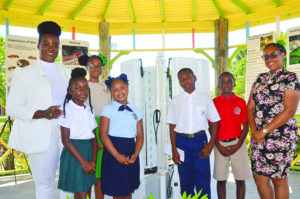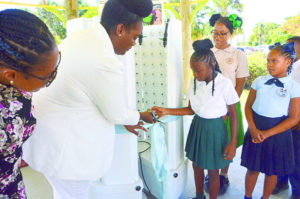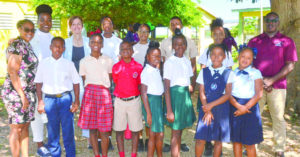
Six Flex-Farm hydroponic units were handed over by the Department of Natural Resources and Agriculture to four primary schools, as well as to the PRU and WISE divisions of the Albena Lake-Hodge Comprehensive School and the Zenaida Haven Juvenile Residential Centre on World Food Day.
World Food Day is an international day celebrated every year on October 16th to commemorate the date of the founding of the United Nations Food and Agriculture Organization in 1945.
The primary schools which were privileged to benefit from this innovative agricultural initiative were the Alwyn Allison Richardson Primary School, Adrian T. Hazell Primary School, the Vivien Vanterpool Primary School and the Morris Vanterpool Primary School.
The Flex-Farm Hydroponic System was introduced to the public earlier this year at the Department of Agriculture. The unit, which was developed and manufactured by the Fork Farm Company, is a vertical appliance that carries some 288 plant spaces, a fully self-contained water system, an energy-efficient LED light tower, a submersible pump, a grower’s toolkit, and starter supply boxes. Each Flex-Farm Unit can grow up to 394 pounds of produce annually.
 The acquisition of the Flex-Farm Hydroponic System for national food security in Anguilla came about through the dedicated efforts of Natural Resource Officer, Ms. Isabel Rosario. Thanks to her passionate, resilient efforts, Anguilla is the first island in the region to utilize this non-traditional method of agriculture.
The acquisition of the Flex-Farm Hydroponic System for national food security in Anguilla came about through the dedicated efforts of Natural Resource Officer, Ms. Isabel Rosario. Thanks to her passionate, resilient efforts, Anguilla is the first island in the region to utilize this non-traditional method of agriculture.
In her address at the handover of the units, Ms. Rosario said: “It is a pleasure to be here this morning, not only to celebrate the handover of these Flex-Farm Units, but to use this opportunity to celebrate World Food Day 2023, with its theme: ‘Water is Life; Water is Food’. These specific hydroponic units that will be handed over today fit well with this theme.”
“According to Fork Farms Partnership Director, Josh Mahlik, ‘The vertical indoor hydroponic system uses 98% less water than traditional agricultural methods.’ It is therefore safe to say that these systems were designed to help save water and promote water efficiency,” she said.
 Ms. Rosario outlined the objectives that the implementation of the indoor hydroponic system aims to meet. “This project seeks to accomplish the following six objectives,” she said: “1. Implementing best practices to mitigate food insecurity…through technology; 2. Creating livelihood opportunities for vulnerable communities with emphasis on women and youth; 3. Providing a model and potential funding for existing subsistence farmers to improve their business model through energy efficient, low maintenance hydroponic technology; 4. Changing the agriculture narrative starting with schools through the implementation of an experimental learning opportunity; 5. Engaging local private actors in supporting local farmers and buying local; and 6. Bolstering the efforts of food security for Anguilla.”
Ms. Rosario outlined the objectives that the implementation of the indoor hydroponic system aims to meet. “This project seeks to accomplish the following six objectives,” she said: “1. Implementing best practices to mitigate food insecurity…through technology; 2. Creating livelihood opportunities for vulnerable communities with emphasis on women and youth; 3. Providing a model and potential funding for existing subsistence farmers to improve their business model through energy efficient, low maintenance hydroponic technology; 4. Changing the agriculture narrative starting with schools through the implementation of an experimental learning opportunity; 5. Engaging local private actors in supporting local farmers and buying local; and 6. Bolstering the efforts of food security for Anguilla.”
In her address, the Honourable Minister of Sustainability, Innovation and the Environment Quincia Gumbs-Marie referred to the Flex-Farm System as a new technique for developing food security at a critical time of our existence, and she highlighted the importance of having young people gain knowledge of this innovative method of agriculture for food security:
“As the Minister of Sustainability, Innovation and the Environment,” she said, “I am committed to revolutionizing the agricultural sector. I am of the firm belief that food security is a national security concern, particularly in the face of global uncertainties caused by climate change, pandemics, natural disasters, wars and the like.”
“I have recognized that maintaining food security is no easy task, given the inherent challenges,” she said. “However, I believe that if we invest in innovative technologies now and introduce our younger generations to the concept of producing their own food, in non-traditional ways, then we are planting seeds that will flourish in time to come.”
Mr. John Millington represented the Zenaida Haven Juvenile Residential Centre and spoke of its enduring commitment to grow its own food, particularly now through the Flex-Farm System.
“I take this opportunity to say thanks to all the parties involved for ensuring that this innovative system of food production did not go pass us at Zenaida,” he said. “A few years ago when I joined the service, I started an integrated programme at the centre where we set out to teach the young men there how to grow their own food…We have grown several fruits and vegetables, including plantains, bananas, pumpkins, watermelons, and sweet peppers, just to name a few. But in recent times we have been affected by a lack of water and soil erosion.”
“Nonetheless,” Mr. Millington said, “today we are thankful that the Zenaida Haven Juvenile Residential Centre and the schools can embrace this opportunity given to us to grow our own food in such an innovative manner. We say thank you to Ms. Rosario, and I promise that we will not disappoint you.”
The ribbon cutting by a school child and Minister Gumbs-Marie, surrounded by other primary school students, ushered in the symbolic presentation of the Flex-Farm units to the young people who would be taking charge of technologically cultivating crops in them.
The Flex-Farm units were made available by the Caribbean Climate Smart Accelerator and funded by Sony Music Global Social Justice Fund. The initiative was supported by Fork Farms Company, an agricultural technology company, based in Wisconsin, USA.








